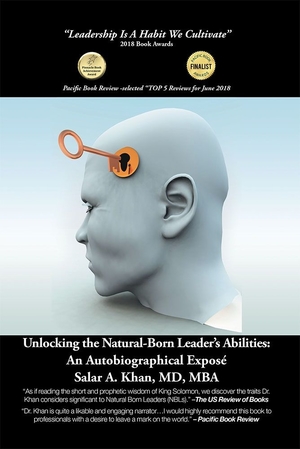
A successful example of what he wishes to convey, award-winning author Salar Khan uses his own life as an illustration of what constitutes leadership in Unlocking the Natural-Born Leader’s Abilities: An Autobiographical Exposé. Carefully presenting an objective picture, Khan shares his own memories to demonstrate the sorts of qualities a natural-born leader (NBL) would have, both innately and from training and experience.
Khan’s early life was rigorous: His parents were forced to migrate from India to Pakistan a few years before he was born, and six of his eleven siblings died by the age of four. When he was eleven, his home city of Karachi was under air attack. His schooling began at the fifth grade level after being homeschooled. In his spare time before classes he helped his mother with housework, and from her he learned about time and risk management.
Khan excelled in school, seemingly blessed with self-confidence, and at his father’s advice, decided on a career in medicine. He became a doctor, a profession he felt he was born to. He worked as a pulmonologist in Saudi Arabia before making the bold step of immigrating to the US where initially he had to work at minimum wage jobs until obtaining an MBA for a new career. Throughout his career and personal life he has successfully overcome negative dynamics, promoted positive outcomes, and won numerous professional awards in the US and internationally.
Khan expounds his belief that leadership begins in childhood with parental guidance through such methods as storytelling, and will increase over the course of one’s life. He believes the NBL should have “an appreciation and understanding of as many perspectives and disciplines as possible.” He or she should recognize and develop intuition, which he uses in the medical field to interpret nonverbal cues from his patients. He states that a basic store of knowledge builds insightfulness and reinforces intuition, a process that leads to self-confidence. He suggests that NBLs actually want to lead, and will take on that role without being asked. This in turn will cause others to look up to the NBL, and that admiration will be enhanced by the leader’s capacity to communicate effectively at any level. He doesn’t think the NBL needs any particular incentive to fulfill the role: “Power, money, beauty and health will not lead to happiness on their own.”
As would be expected, Khan writes with confidence, and with a gentle sense of humor. He seems to be able to look at himself as a subject of his story without undue ego, while still extolling the many skills that have gotten him to his place in life. He provides useful charts and diagrams to underpin his points. The book ends with a simple, one-page self-assessment tool that the reader can use for exploring his or her own leadership qualities, including such simple statements as “I am insightful,” and “I have fearlessness in making critical decisions.”
Khan has walked the walk and now talks the talk, expressing his sincere wish that others might gain by his experience as a natural-born leader. Given the tumultuous path he has walked down, this book has much more to offer than the typical book on leadership, offering a unique and inspiring work of leadership training that can be used in both work and everyday life.
Book Links
STAR RATING
Design
Content
Editing
Get an Editorial Review | Get Amazon Sales & Reviews | Get Edited | Get Beta Readers | Enter the SPR Book Awards | Other Marketing Services























Leave A Comment